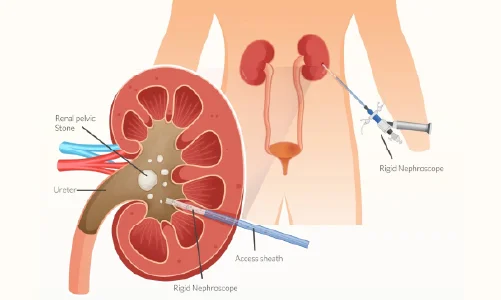Kidney stones can cause severe pain and lead to serious complications if not treated properly. Surgery is often necessary for larger kidney stones due to their potential to cause severe pain, complications, and ineffectiveness of non-surgical treatments.
Procedures like percutaneous nephrolithotomy (PCNL) offer a minimally invasive and highly effective solution for removing large or complex stones. If you are experiencing symptoms of kidney stones, consult with the best urologists at CK Birla Hospital to explore the most suitable treatment options for your condition.

Percutaneous nephrolithotomy (PCNL) is a minimally invasive surgical procedure that can effectively remove large or complex kidney stones that cannot be extracted using any other method.
During the procedure, a small incision is made in the back, and a nephroscope is inserted into the kidney to locate and remove the stones.
PCNL is typically recommended for stones larger than 2 cm, staghorn calculi, or stones that have not responded to other treatments.
Preventive Measures Against Kidney Stones
| Aspect | Minimally Invasive Surgery | Traditional Open Surgery |
| Incisions | Smaller incisions | Larger incisions |
| Recovery Time | Shorter recovery period | Longer recovery period |
| Pain and Scarring | Less pain and minimal scarring | More pain and noticeable scarring |
| Hospital Stay | Shorter hospital stay | Longer hospital stay |
| Infection Risk | Reduced risk of infection | Higher risk of infection |
PCNL procedure typically takes about 2-3 hours, depending on the size and complexity of the kidney stones.
Most patients will need to stay in the hospital for 1-2 days after the procedure to monitor recovery and manage any immediate complications.
Patients can usually return to light activities within 1-2 weeks, but full recovery and return to normal activities may take up to 4-6 weeks.
Yes, alternatives include extracorporeal shock wave lithotripsy (ESWL) and ureteroscopy, but PCNL is often preferred for larger or more complex stones.
If you experience severe pain, fever, or other complications after PCNL, contact your surgeon or healthcare provider immediately for evaluation and management.
PCNL is highly effective in removing large kidney stones, with a high success rate and low recurrence rate when patients follow preventive measures post-surgery.
If you are considering PCNL in <City>, the CK Birla Hospital is here to provide you with expert care and support. Contact us to schedule a consultation with our experienced urologists.